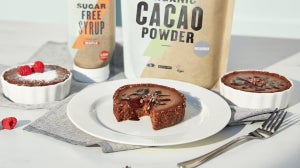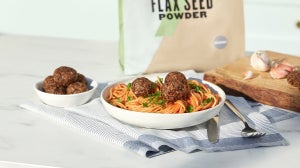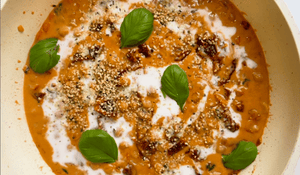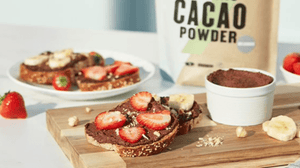
When following a plant-based diet, it can be difficult to know what the best options are for you when trying to figure out how to get rid of a cold or flu. There are, however, plenty of natural cold remedies and immune boosting foods out there that you can fit into your diet, and not just when you’re unwell either. Vegan-friendly supplements are also an extremely convenient and efficient way to boost daily intake of essential micronutrients, particularly if you don’t have time or are too unwell to cook with fresh ingredients.
If you’re currently trying to fight a cold, fear not! We’ve put together a selection of vegan-friendly cold remedies, supplements and immunity boosters - along with the science behind them - to give you plenty of tips on how to fight a cold.
15 Vegan-Friendly Cold & Flu Remedies
Fruit & Veggies
If you follow a plant-based diet to begin with, you’ll probably already be eating plenty of fruits and vegetables. However, certain varieties may help you on your way to fighting off that pesky common cold.

1. Berries & Vitamin C Rich Fruits
We all know that fruit is a good source of vitamins and minerals, however, certain fruits such as strawberries, cranberries and blueberries are rich in compounds known as anthocyanins, which have anti-viral, anti-inflammatory and immune-boosting properties1. Fruits with high amounts of anthocyanins have been found to prevent common viruses and bacteria from attaching to cells2. Throw some berries into the blender and make a cooling smoothie to help soothe a sore throat or use them to top off an acai bowl to give it a fruity, immune boosting twist.
Vitamin C has also been shown to support immune function, so snacking on foods that are good sources of it, such as oranges, red and green peppers, broccoli and strawberries may be worth doing when you’re feeling under the weather.3
2. Avocados
Avocados are a great option for foods to feed your cold. If you’re struggling to eat because of a sore throat or perhaps even a dodgy tummy, avocados are soft and bland whilst still being rich in fibre, vitamins and minerals. In addition, the healthy fats they contain, known as oleic acid, have anti-inflammatory properties and have also been found to play a role in the function of your immune system4.
3. Leafy Greens
Eating plenty of leafy greens when you’re sick is also a must. Leafy greens have been used historically for their antibacterial properties, and in particular, dark green vegetables are packed with plant compounds which act as antioxidants and help fight inflammation5,6.
Supplements
Making sure your diet is packed with immune boosting foods is one way to help you fight off the common cold, but sometimes if you don’t really feel like eating it can be difficult to get them in. This is where supplements come in handy.

4. Zinc
Zinc is an important mineral which supports normal immune health as well as metabolism, making it a popular choice for common cold treatments. Zinc also contributes to normal cognitive function, which is an essential part of general health and well-being.
5. Vitamin D
Vitamin D can also be useful too, playing an important role in the body by contributing to the normal functioning of the immune system as well as maintenance of normal bones, teeth, and muscle function.7 The primary source of vitamin D is through sun exposure, and vegan-friendly food sources are limited mainly to mushrooms and fortified foods such as plant milks or cereals. This means that it can be easy to become deficient in this important micronutrient. According to US government figures, approximately 40% of the population has low levels of vitamin D.8 Vitamin D supplements are a super convenient way to support your well-being and get your daily dose of the sunshine vitamin.
6. Vitamin B12
For those following a strict plant-based diet, it is worth considering a vitamin B12 supplements to ensure your body gets all of the support it needs, particularly when recovering from illness. Like vitamin D, vitamin B12 is one of the harder vitamins to source naturally on a vegan diet as B12 is most commonly associated with animal-based products.
Vitamin B12 is an essential vitamin and contributes to a wide range of different important functions in the body, from supporting normal energy-yielding metabolism, to red blood cell formation and cell division. Importantly, vitamin B12 helps to reduce tiredness and fatigue whilst contributing to the normal function of the immune system, which is vital when you are feeling under the weather.9,10
Plants, Herbs & Spices
When it comes to natural cold remedies, there are a number of plant and herb-based options for you to try that may get you on the right track to feeling better.
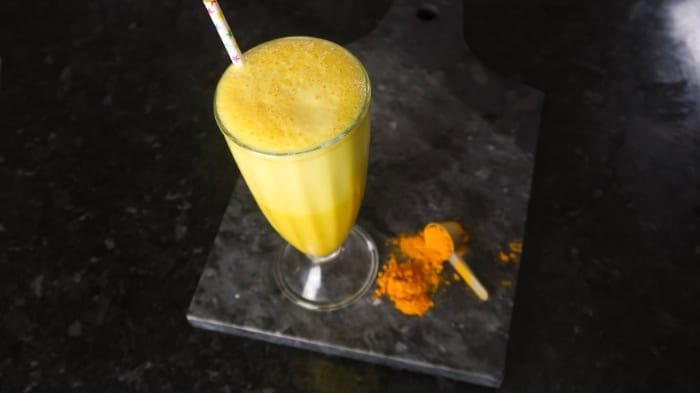
7. Echinacea
Let’s start with one of the more common ones - echinacea. Echinacea has long been used traditionally for medicinal purposes and it’s been found to have anti-inflammatory, anti-viral and antioxidant properties.11 Whilst there is mixed evidence in terms of how effective it is at actually fighting a cold, it’s been suggested that drinking echinacea tea could actually reduce the duration of symptoms.
8. Ginger
Similar to echinacea, when it comes to home remedies for cold and flu you can’t go wrong with ginger root. With a long history of use in traditional medicine, ginger contains a compound called gingerol which is responsible for many of the associated health benefits, including antioxidant and anti-inflammatory effects12. In addition, if you’re feeling a little on the queasy side, ginger has been found to be an effective remedy for nausea too.13 Either opt for ginger tea, or add some to a smoothie to give it a little extra kick like in this antioxidant Turmeric Smoothie Recipe, which packs plenty of punch!
9. Marshmallow Root
Sadly this doesn’t mean snacking on marshmallows will improve a cold! Marshmallow root is derived from a perennial herb and is used in some natural cold remedies. Syrups containing marshmallow root have been found to be effective in relieving coughs, as it’s thought to contain an enzyme which helps to inhibit bacteria and loosen mucus14, 15.
10. Garlic
Believe it or not, garlic can also be useful when it comes to fighting the common cold. This is because it contains compounds that have been found to help the immune system fight germs, with some studies indicating that it may reduce the severity of cold and flu symptoms, as well as the duration of your illness.16, 17 One way to incorporate this into your diet while you’re recovering is by adding it to some classic comfort food.
Why not try our delicious Creamy Garlic Mushroom Pasta recipe?
Looking After You

Of course it’s important to look after yourself with immune boosting foods and by topping up those vitamins and minerals, but when you’re struck down with cold or flu, it’s important to take care of yourself in other ways too. Here are a few final tips when it comes to natural cold remedies and looking after yourself:
11. Stay hydrated
Nutrition is important, but it is equally important to stay hydrated by drinking plenty of water, especially if you’re fighting a fever. If you’re not keen on plain water, try herbal teas or green tea instead.
12. Get plenty of rest
Avoiding stress is one of the best ways to prepare your body physically and mentally to fight off sickness. Whilst staying at home is good for avoiding spreading your illness, it is also a chance to slow the pace of things down and do things that are relaxing such as meditation, reading, yoga or even baking.
13. Have a warm bath
A warm bath is a great way to ease any aches and pains that the body may . You can also add essential oils such as lavender, tea tree or eucalyptus to create a more soothing effect.
14. Gargle with salt water
Gargling salt water is a great way to ease a sore throat and loosen mucus.18 Mix approximately ¼ to ½ a teaspoon of table salt with 100-200mls warm water, then gargle the salt water and spit it out.
15. Regularly wash your hands
Everybody know that washing your hands properly with soap and warm water is a vital part of self-hygiene. This is especially relevant after coughing, sneezing or blowing your nose to prevent germs spreading.
Summary
There are many natural plant-based remedies that are associated with health benefits that can improve general well-being or help to improve the symptoms associated with cold and flu. These can be foods that can be incorporated into meals or smoothies, such as leafy greens or berries high in anthocyanins. Other remedies can be made in the form of a comforting warm tea, such as ginger root or echinacea. When cooking with fresh ingredients isn’t an option, supplements are an extremely convenient way to ensure you meet the daily recommended intake of essential vitamins and minerals.
As well as keeping on top of nutritional intake, it’s important to make sure your lifestyle habits are adjusted to make sure your body can recover as quickly as possible. This means getting plenty of sleep, staying hydrated and doing things to help reduce stress such as having a warm bath or meditating.
Remember, some things can’t be rushed however we can make small changes and choices to give our bodies what it needs to get better.
Written by Amy Jackson - Content Writer at Discount Promo Codes
- Wu, X., Beecher, G. R., Holden, G. M., Haytowitz, D. B., Gebhardt, S. E., & Prior, R. L. (2006). Concentrations of anthocyanins in common foods in the United States and estimation of normal consumption. Journal of Agriculture & Food Chemistry. 31;54 (11).
- Knox, Y. M., Hayashi, K., Suzutani, T., Ogasawara, M., Yoshida, I., Shiina, R., Tsukui, A., Terahara, N., & Azuma, M. (2001). Activity of anthocyanins from fruit extract of Ribes nigrum L. against influenza A and B viruses. Acta Virologica. 45 (4).
- Carr, A. C., & Maggini, S. (2017). Vitamin C and Immune Function. 3;9(11).
- Sales-Campos, H., Souza, P. R., Peghini, B. C., da Silva, J. S., & Cardoso, C. R. (2013). An overview of the modulatory effects of oleic acid in health and disease. Mini Rev Med Chem. 13(2).
- Ramesa, S. B., & Sooad, A-D. (2014). Phytochemical constituents and antibacterial activity of some green leafy vegetables. Asian Pac J Trop Biomed. 4(3).
- Krishnaswamy, K., & Raghuramulu, N., (1998). Bioactive phytochemicals with emphasis on dietary practices. Indian J Med Res. 108: 167-81.
- Hewison, M. (2011). Vitamin D and innate and adaptive immunity. Vitam Horm. 86:23-62.
- Parva NR, et al. Prevalence of Vitamin D Deficiency and Associated Risk Factors in the US Population (2011-2012). Cureus. 2018; 10(6):e2741-e.
- Tucker, K. L., Hannan, M. T., Qiao, N., Jacques, P. F., Selhub, J., Cupples, L. A., & Kiel, D. P. (2005). Low plasma vitamin B12 is associated with lower BMD: the Framingham Osteoporosis Study. J Bone Miner Res. 20(1):152-8.
- O’Leary, F., & Samman, S. (2010). Vitamin B12 in Health and Disease. 2(3): 299-316.
- Chiou, S. Y., Sun, J. M., Huang, P. W., Lin, S. D. (2017). Antioxidant, Antidiabetic, and Antihypertensive Properties of Echinacea purpurea Flower Extract and Caffeic Acid Derivatives Using In Vitro Models. J Med Food. 20(2): 171-179.
- Wang, S., Zhang, C., Yang, G., & Yang, Y. (2014). Biological properties of 6-gingerol: a brief review. Nat Prod Commun. 9(7): 1027-30.
- Ernst, E., & Pittler, M. H. (2000). Efficacy of ginger for nausea and vomiting: a systematic review of randomized clinical trials. Br J Anaesth. 84(3):367-71.
- Büechi, S., Vögelin, R., von Eiff, M. M., Ramos, M., & Melzer, J. (2005). Open Trial to Assess Aspects of Safety and Efficacy of a Combined Herbal Cough Syrup with Ivy and Thyme. Complementary Medicine Research. 12:328-332.
- Sendker, J., Böker, I., Lengers, I., Brandt, S., Joachim, J., Timo, S., Hofmann, T., Fink, C., Abdel-Aziz, H. (2017). Phytochemical Characterization of Low Molecular Weight Constituents from Marshmallow Roots (Althaea officinalis) and Inhibiting Effects of the Aqueous Extract on Human Hyaluronidase-1. Nat. Prod. 80(2):290-297.
- Arreola, R., Quintero-Fabian, S., Lopez-Roa, R. I., Flores-Gutierrez, E. O., Reyes-Grajeda, J. P., Carrera-Quintanar, L., & Ortuno-Sahagun, D. (2015). Immunomodulation and anti-inflammatory effects of garlic compounds. J Immunol Res.
- Nantz, M. P., Rowe, C. A., Muller, C. E., Creasy, R. A., Stanilka, J. M., & Percival, S. S. (2012). Supplementation with aged garlic extract improves both NK and γδ-T cell function and reduces the severity of cold and flu symptoms: a randomized, double-blind, placebo-controlled nutrition intervention. Clin Nutr. 31(3):337-44.
- Satomura, K., Kitamura, T., Kawamura, T., Shimbo, T., Watanabe, M., Kamei, M., Takano, Y., & Tamakoshi, A. Prevention of upper respiratory tract infections by gargling: a randomized trial. Am J Prev Med. 29(4): 302-7.


